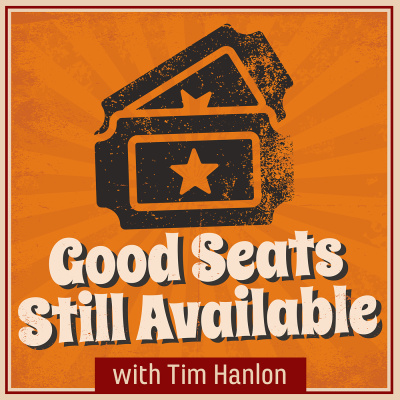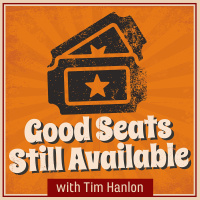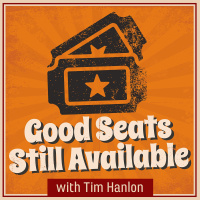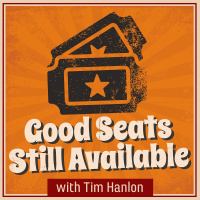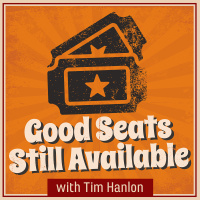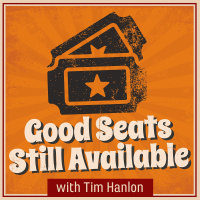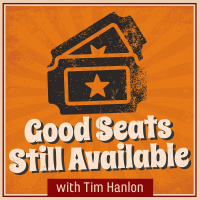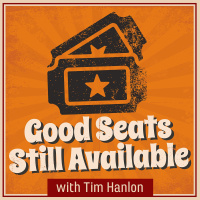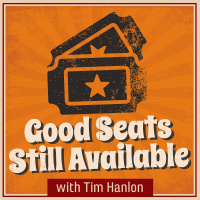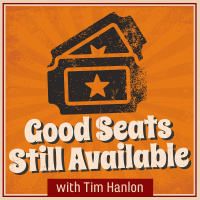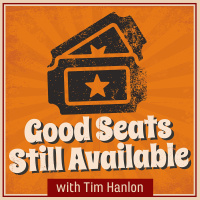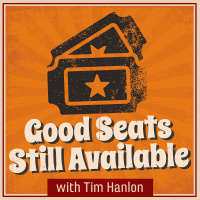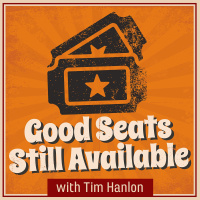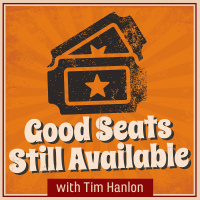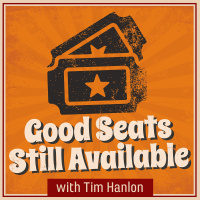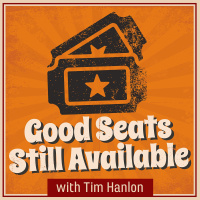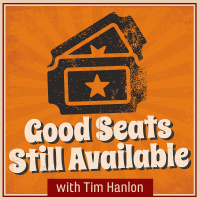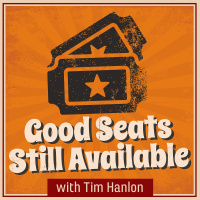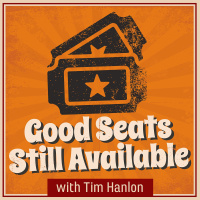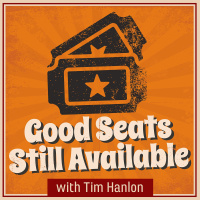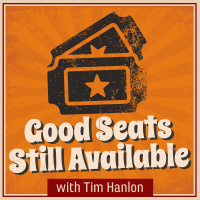Synopsis
Good Seats Still Available is a curious little podcast devoted to the exploration of what used-to-be in professional sports. Each week, host Tim Hanlon interviews former players, owners, broadcasters, beat reporters, and surprisingly famous "super fans" of teams and leagues that have come and gone - in an attempt tounearth some of the most wild and woolly moments in (often forgotten) sports history.
Episodes
-
188: The Original National Lacrosse League - With Dave Coleman & Steve Holroyd
02/11/2020 Duration: 01h40minOur resident lax experts Dave Coleman and Steve Holroyd ("Two for the Show") return to help us dig deeper into the largely untold story of the original National Lacrosse League - the seminal mid-70s indoor circuit that helped lay the groundwork for modern-day professionalization of one of North America's oldest organized sports. Originally conceived by NHL hockey owners as a means of filling their arenas in the off-season summer months, the NLL consisted of six clubs in each of its 1974 (Maryland Arrows, Montreal Quebecois, Philadelphia Wings, Rochester Griffins, Syracuse Stingers, Toronto Tomahawks) and 1975 (Maryland, Montreal, Philadelphia - and the relocated Long Island Tomahawks, Quebec Caribous, and Boston Bolts) season. While sizable crowds flocked to the league's fast-paced, rough-and-tumble summertime box lacrosse action in Philadelphia, suburban DC's Landover, Maryland, and Montreal - the NLL's other franchises found the going much tougher. When it came time for a planned third season in 1976
-
187: The Original World Team Tennis - With Steven Blush
26/10/2020 Duration: 01h37minPop culture writer/filmmaker Steven Blush ("American Hardcore") joins the festivities this week to (at long last) help us delve into the enigmatic story of the original 1970s-era incarnation of World Team Tennis - including an exclusive preview of his upcoming book & documentary Bustin' Balls: World Team Tennis - Pro Sports, Pop Culture and Progressive Politics. From the "Bustin' Balls" book dust jacket: "Tennis. Exquisitely tailored white outfits. Formally attired spectators. Stiff upper lips and utterly antiquated attitudes that made the sport accessible only to wealthy WASPs. "'Tennis is the perfect combination of violent action taking place in an atmosphere of total tranquility,' said legendary rule-breaker Billie Jean King in 1973. "By 1974, Ms. King and a group of investors made up of fans, promoters, and at least one used-car salesman crashed the country clubs and well-manicured courts with the creation of World Team Tennis - and eliminated proper etiquette in tennis forever. "Ten
-
186: Negro Leaguers & Baseball's Hall of Fame - With Steven Greenes
19/10/2020 Duration: 01h17minWhen legendary Red Sox slugger Ted Williams gave his induction speech at the National Baseball Hall of Fame on July 25, 1966, he unexpectedly included a blunt admonition to the sport's establishment that something in the hallowed Hall was significantly awry - the absence of standout players from the Negro Leagues: "I've been a very lucky guy to have worn a baseball uniform, and I hope some day the names of Satchel Paige and Josh Gibson in some way can be added as a symbol of the great Negro players who are not here - only because they weren't given a chance." The "Splendid Splinter" was referring to two of the most famous names in the Negro Leagues, who were not given the opportunity to play in the Major Leagues until Jackie Robinson broke the color barrier in 1947. (Gibson died early in 1947 and never played in the majors; Paige's brief major league stint came long past his prime.) Williams biographer Leigh Montville called the broadside "a first crack in the door that ultimately would open and include
-
185: NHL Hockey by Design - With Chris Creamer & Todd Radom
12/10/2020 Duration: 01h32minLogo archivist Chris Creamer (SportsLogos.net) and graphic brand designer Todd Radom (Todd Radom Design) join this week's show to dive into the rich and fascinating visual story of the National Hockey League's nearly 103-year history - as told by the names, logos and uniforms of its teams. Their new book collaboration Fabric of the Game: The Stories Behind the NHL's Names, Logos and Uniforms is a comprehensive look into the rationale behind and the execution of the iconography of each of the league's major historical franchise lineages - from the respective journeys of today's 32 teams to the forgotten former clubs of yore. Of course, we go long and hard into the visual foibles of the latter - who can forget the Cleveland Barons, Kansas City Scouts, Colorado Rockies, California/Oakland/Bay Area/California Golden Seals, the Atlanta Thrashers, or even the New York/Brooklyn Americans? But there are plenty of revealing tidbits and surprising twists for fans of today's NHL franchises - including directionless St
-
184: Birmingham's Quixotic Quest for Pro Pigskin - With Scott Adamson
05/10/2020 Duration: 01h34minVeteran sportswriter and Birmingham, AL native Scott Adamson (The Home Team: My Bromance with Off-Brand Football) joins the pod to discuss his curious decades-long relationship with the various attempts at rooting pro football in the "Magic City." Birmingham's venerable Legion Field - known legendarily as the "Football Capital of the South" for its long-time association with the annual Alabama-Auburn "Iron Bowl" college season-ender - has also been home base for a parade of franchises in virtually every major challenger pro football league since the 1970s, including: The World Football League "World Bowl" champion Birmingham Americans (1974); 1975's de facto title-winning Birmingham Vulcans of the reincarnated second edition WFL; The USFL's perennially competitive Birmingham Stallions (1983-85); The World League of American Football's Birmingham Fire (1991-92); 1995's Birmingham Barracudas of the Canadian Football League; The woeful Birmingham Thunderbolts of 2001's original XFL; AND The pla
-
183: Negro League Baseball's "Invisible Men" - With Donn Rogosin
28/09/2020 Duration: 01h23minFrom the book jacket of the 2007 reissue of Invisible Men: Life in Baseball's Negro Leagues - the seminal 1983 book by this week's guest Donn Rogosin: "In 1947, Jackie Robinson broke baseball's color barrier and became a hero for [B]lack and white Americans, yet Robinson was a Negro League player before he integrated Major League baseball. Negro League ballplayers had been thrilling [B]lack fans since 1920. Among them were the legendary pitchers Smoky Joe Williams, whose fastball seemed to "come off a mountain top," Satchel Paige, the ageless wonder who pitched for five decades, and such hitters as Josh Gibson and Buck Leonard, 'the Ruth and Gehrig of the Negro Leagues.'" "Although their games were ignored by white-owned newspapers and radio stations, [B]lack ballplayers became folk heroes in cities such as Chicago, Kansas City, Pittsburgh, Philadelphia, New York, and Washington, DC - where the teams drew large crowds and became major contributors to the local community life. This illuminating narrative, fill
-
182: National League Baseball's Cleveland Spiders - With Eric Nusbaum
21/09/2020 Duration: 56minWriter/author (and Episode 158 guest) Eric Nusbaum ("Stealing Home: Los Angeles, the Dodgers, and the Lives Caught in Between") returns for a second visit, this time to help us obsess about the curious story of the National League's 1899 Cleveland Spiders - the worst major league baseball team of all time. While today's current generation of baseball fans will swear that the 1962 NL expansion New York Mets (40-120 record; .250 winning percentage), the 2003 AL Detroit Tigers (43–119; .265), or even the 2018 AL Baltimore Orioles (47-115; .290) might each own the record for on-field futility - none come close to the stunningly woeful 20-134 (.130) performance turned in by Cleveland's first major league team, one that preceded and indirectly influenced today's AL Indians. The Spiders were a consistently competitive team in the 1890s - loaded with eventual Hall of Fame talents like Bobby Wallace, Jesse Burkett and legendary pitching ace Cy Young. Attendance and ticket revenue, however, were terrible - hindered sig
-
181: Columbus' IHL Hockey Heritage - With Eric Weltner
14/09/2020 Duration: 01h42minLittle did we know when we dropped our minor league hockey tribute to the 1990s ECHL Columbus Chill in our Episode 169 with David Paitson & Craig Merz earlier this year that it would not only become our most listened-to episode of 2020 (so far), but would also unearth a project devoted to the colorful history of the forgotten teams that preceded it. Columbus native and Cincinnati creative agency professional Eric Weltner ("International Incidents"), previews his soon-to-be-released 80-minute documentary of "old-time hockey gold" devoted to the three clubs in the rock 'em, sock 'em International Hockey League that called Ohio's capital city (and the scruffy Ohio Expo Fairgrounds Coliseum) home during the late 1960s and early 1970s: The Columbus Checkers (1966-70): the city's first-ever professional hockey franchise - a "Plan B" sports ownership pursuit for Cleveland's entrepreneurial Schmeltzer brothers, after just missing out on the NBA's Boston Celtics; The Columbus Golden Seals (1971-73): Charlie O. Fi
-
180: Washington NFL Football's "R-Word" - With Rich King
07/09/2020 Duration: 01h22minColumbia College Chicago cultural studies professor Rich King (Redskins: Insult and Brand) joins the podcast this week to discuss the roots and long-simmering backstory of the Washington NFL football franchise's problematic - and now former - nickname. Investigative reporter Tisha Thompson framed the situation in her recent piece for ESPN: “Daniel Snyder endured decades of protests, lawsuits and emotional appeals over the nickname of his Washington NFL team. ‘We'll never change the name,’ he told USA Today in 2013. ‘It's that simple. NEVER -- you can use caps.’ “Then, in a blinding rush this summer, the name long criticized by Native Americans and others was gone. “But the change didn't feel sudden to the coalition of Native American groups that started working long ago to force Snyder's hand by investing in the corporations that pay hundreds of millions of dollars for sponsorship deals.” Amplified by a renewed national furor over racial injustice sparked by the death of George Floyd - and opportunely re
-
179: WHA Hockey "Lost & Found" - With Dennis Murphy
31/08/2020 Duration: 42minIf we ever get around to creating a Good Seats Still Available "Hall of Fame," this week's return guest will most certainly be part of its inaugural class of inductees. Dennis Murphy (“Murph: The Sports Entrepreneur Man and His Leagues”) is a bona fide legend in sports entrepreneurial circles - a man responsible for helping found no less than four "major" game-changing leagues across the North American pro sports landscape, including the polychromatic American Basketball Association (our previous Episode 129), and this week's focus: the raucous World Hockey Association. (The others: World Team Tennis and Roller Hockey International.) This week's shorter-than-normal episode was originally intended to be our second full-length discussion with "Murph" - and our first exclusively devoted to the founding and operation of the WHA - until events last year conspired against it. A scheduling snafu resulted in a shorter window of conversation than originally intended, and the recording itself was feared lost during o
-
178: "PF's Tape Recorder" - With P.F. Wilson (Vacation Special)
24/08/2020 Duration: 48minWe steal away for a little summer vacation time this week - but not before sitting down for a massively enjoyable interview with fellow defunct sports enthusiast and long-time friend-of-the-show P.F. Wilson - as a guest on his comedy-tinged podcast "PF's Tape Recorder." P.F. (née Patrick François) is also the creative engine behind one of our longest-running sponsors OldSchoolShirts.com - where our listeners can enjoy a 10% discount on everything in the store, when using the promo code "GOODSEATS" at checkout. Tim and P.F. obsess about all things defunct - including Gary Davidson's WFL Waterloo, the directionally challenged "New York/New Jersey" moniker, long-forgotten college bowl games, who/what (really) killed the USFL, and the MISL's (barely) one-season wonder New Jersey Rockets. Please enjoy this conversation we recorded a few weeks back - and thanks to both P.F. and OldSchoolShirts.com for their support of the show!
-
177: The (Original) Winnipeg Jets – With Curtis Walker
17/08/2020 Duration: 01h14minWe cross the virtual border northward this week to obsess about the original incarnation of hockey's Winnipeg Jets - with author/team completist Curtis Walker ("Winnipeg Jets: The WHA Years Day By Day"; "Coming Up Short: The Comprehensive History of the NHL's Winnipeg Jets"). One of the twelve founding franchises in the upstart World Hockey Association's inaugural 1972-73 season, the Jets were one of only four teams to survive the entire run of the rebel league - and to ascend into the vaunted NHL after its demise in 1979. They were also, arguably, the WHA's most successful club - winning three of the league's seven-ever AVCO Cup championships, while finishing as playoff runners-up twice. (We'll get into the story of the Houston Aeros' two titles and one finals loss in another episode!) Walker helps us proverbially "scratch the surface" of the Jets' intriguing history in not only the WHA (including the credibility-validating, league-collective-funded signing of Bobby Hull; the Swedish-flavored "Hot Line" cont
-
176: The Continental Indoor Soccer League – With Ronnie Weinstein
10/08/2020 Duration: 01h50minBy popular demand, former Los Angeles Lazers president and Episode 166 guest Ronnie Weinstein returns for an eagerly-awaited "part two" conversation about his sojourn through professional indoor soccer - this time centered on the intriguing story of the 1990s-era Continental Indoor Soccer League he helped create and operate. Loosely borne from the 1992 collapse of the Major (née Indoor) Soccer League, the idea for what ultimately became the CISL actually germinated from Weinstein's last days running the Lazers in the spring of 1989. It was then when team (and legendary Lakers/Kings/Forum) owner Jerry Buss - while pulling the plug on his money-losing MISL club - opined on the stronger financial merits of a league based in the summer, when the NBA & NHL were out of season, and arena owners were eager to fill dates with quality sports product. Weinstein took Buss' words to heart, and with his mentor's support - along with that of fellow sports mogul Jerry Colangelo - convinced more than a dozen major league
-
175: Cycling's Tour de Trump – With Peter Nye
03/08/2020 Duration: 01h36minCycling writer/historian Peter Nye (Hearts of Lions: The History of American Bicycle Racing) joins the podcast this week to help us understand the long and curious backstory behind the 1989 launch of the Tour de Trump - a major world-class cycling event that, for a brief period, aspired to become the American equivalent of the sport's iconic Tour de France. Once the king of sports in the US at the turn of the 20th century (prominent cycling competitions in the early 1900s routinely drew thousands of paying spectators, attracted significant wagering action and stretched across multiple days), bicycle racing fell precipitously from the national sporting spotlight in the decades that followed - until major outdoor stage races backed by progressive sponsors like Celestial Seasonings and Coors rekindled interest during the late 1970s/early 1980s. Buoyed by building enthusiasm for the sport from CBS' increased television coverage of the Tour de France in the US, an unlikely alliance - sports TV host/music composer
-
174: WUSA, WPS & NWSL Soccer – With Beau Dure
27/07/2020 Duration: 01h46minAs the National Women's Soccer League concludes its deftly assembled 2020 Challenge Cup tournament (with congrats to the Houston Dash on their first-ever major trophy), we enlist sportswriter/soccer insider Beau Dure ("2012: The Year That Saved Women's Soccer") to help us make sense of the confoundingly discontinuous history of the women's pro game in the US over the last 20 years - and the unwitting origin story of the NWSL. Against the backdrop of an undeniably prolific US Women's National Team - a program that has produced four FIFA Women's World Cup titles, four Olympic gold medals and currently (and regularly) sits atop the FIFA Women's World Rankings - the path to building and sustaining a viable top-tier women's domestic pro league over that time has proven surprisingly quixotic. While the reasons are myriad, Dure navigates us through: The Women's United Soccer Association (WUSA): the big-money, TV-backed, John Hendricks-boostered attempt to create a first-ever pro league in the wake of 1999's break
-
173: Ontario Speedway, The International Race of Champions & More – With Dave Lockton
20/07/2020 Duration: 01h30minLongtime sports/information technology entrepreneur/executive Dave Lockton joins this week to discuss his managerial adventures in the geographically fragmented and provincially fractious auto racing scene of the late 1960s/early 1970s – including the founding of the groundbreaking Ontario Motor Speedway, and its role in the ideation of the ultimate “all-star” professional driving competition – the International Race of Champions (IROC). Sports fans of a certain age will surely remember the old IROC series – which ran for 30 seasons starting in 1973 – where the best drivers from the world’s top auto racing disciplines raced one another in equally prepared and equitably crewed cars to determine motorsports’ “ultimate” annual champion. Multi-circuit veteran Tony Stewart (who won the final IROC XXX in 2006) certainly does – he and fellow NASCAR Hall of Famer Ray Evernham are teaming to reinvent the format next summer with a nationally televised six-race, short-track series to air in prime time on CBS called the
-
172: The Forgotten Pro Teams of New Orleans – With Nick Weldon
13/07/2020 Duration: 01h22minWe point our GPS coordinates this week to the endearingly enigmatic city of New Orleans, for an overdue look into the Big Easy’s chaotic pro sports franchise history – with Historic New Orleans Collection writer (and recovering sports scribe) Nick Weldon (“A Streetcar Named Basketball”). Although a mainstay of baseball’s minor and Negro leagues since the dawn of the sport’s professional era in the late 1800s (including Louis Armstrong’s well-outfitted, attention-grabbing, but largely lamentable 1931 barnstorming “Secret Nine” club), Louisiana’s largest city has been considered more of a football town over the last half-century – especially after the arrival of the NFL Saints in 1967. But it’s the pursuit (and occasional success) of pro basketball that has captured the fancy of local sports entrepreneurs most in the intervening decades – providing the Crescent City with some of its most fascinating, yet oft-forgotten sporting exploits: The American Basketball Association’s Buccaneers (1967-70) – a charter mem
-
171: Pittsburgh's Pro Hoops History – With Stephen J. Nesbitt
06/07/2020 Duration: 01h15minPittsburgh-based The Athletic sportswriter Stephen J. Nesbitt (“How the Pipers, Condors and Pro Basketball in Pittsburgh Went Extinct”) joins to help us dig into the surprisingly rich (though mostly woeful) history of professional hoops in the Steel City. Though the game has long thrived at the collegiate level (Pitt’s Panthers began playing in 1905; the Duquesne Dukes in 1914), the city’s record of success at the pro level has been distinctly more fleeting. In fact, some would argue it was never better than the pre-integration Black Fives era of the 1910s/20s, when eventual Naismith Hall of Famer Cumberland Posey led his Monticello (1912) and Loendi Big Five (1919-23) clubs to five “Colored” Basketball World Championships. As professional (and eventually integrated) leagues took root in the decades that followed, Pittsburgh’s attractive demographic profile made it a natural choice for inaugural – yet ultimately short-lived – franchises in virtually every major hardwood circuit that came calling, including:
-
170: The 1969 Washington Senators – With Steve Walker
29/06/2020 Duration: 01h26minWhen the original version of the modern-era Washington Senators announced its intention to relocate to Minneapolis-St. Paul in 1960 to become the Twins the following season, Major League Baseball moved up part of its planned 1962 expansion by a year to help stave off dual competitive threats of both a new challenger Continental League and the potential loss of its longstanding federal antitrust exemption. To placate regulators, the American League reworked its plans and replaced the departing DC franchise with an entirely new expansion club – to also be known as the Senators – to commence immediately in its wake for 1961. After an “inaugural” season at old Griffith Stadium, the new Senators moved to the new District of Columbia Stadium under a 10-year lease. For most of their second incarnation, the “new” Senators were just as woeful as their predecessors, losing an average of 90 games a season and perennially finishing below .500 – helping preserve the traditional lamentation to which DC area fans had becom
-
169: The Columbus Chill – With David Paitson & Craig Merz
22/06/2020 Duration: 01h35minWe take a rare dip into the minors this week with the intriguing story of hockey’s Columbus Chill – the 1990s sensation that took the East Coast Hockey League and the Ohio capital’s sports scene by storm, and helped set the table for Columbus’s ascension into top-tier “major league” status by the dawn of the 2000s. Historically overshadowed by the scale, prowess and outsized culture of its hometown Ohio State University Buckeyes athletics programs, Columbus’ pro sports landscape in 1991 largely consisted of AAA baseball’s sleepily long-standing Yankees affiliate Clippers – and not much else. Professional hockey, specifically, had been absent from the market for 14 years, after a largely lamentable run of thinly supported International Hockey League franchises (Checkers, Golden Seals, Owls) during the late 60s and 1970s. But though cheeky marketing campaigns and promotion-laden game-day experiences – targeted at both the growing city’s young professional set and fun-seeking OSU students looking for off-campus
